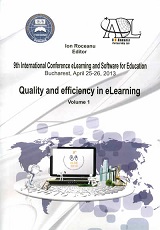THE EFFECTIVENESS OF COMBINING E-LEARNING AND CLASSROOM INTERACTION IN DISTANCE EDUCATION AT THE BUCHAREST ACADEMY OF ECONOMIC STUDIES
THE EFFECTIVENESS OF COMBINING E-LEARNING AND CLASSROOM INTERACTION IN DISTANCE EDUCATION AT THE BUCHAREST ACADEMY OF ECONOMIC STUDIES
Author(s): Virginia Mihaela DumitrescuSubject(s): Education
Published by: Carol I National Defence University Publishing House
Keywords: E-learning; distance education; blended learning; labour market
Summary/Abstract: The paper looks at the recent implementation of e-learning in distance education at the Academy of Economic Studies at a time when e-education is becoming an increasingly popular, and significantly less costly, training option all over the world. After considering the various advantages and disadvantages of e-learning compared to traditional education methods, it points out the benefits of combining technology-mediated learning with class-room activity even in distance education, in keeping with the specific cultural characteristics of a predominantly Romanian student population that still needs a minimum amount of face-to-face teacher-student interaction. Our cultural perspective is largely based on the work of well-known Western researchers in the area of interculturalism, as well as on the latest studies carried out by Romanian scholars Adina Luca, Angelica Neculăesei and Maria Tătăruşanu, who have examined the Romanian culture in the light of Western models of analysis, thus contributing to a better understanding of our culturally determined patterns of thought and behaviour. The Romanian authors’ insights into their own culture help explain the effectiveness of blended learning (compared to other education methods) as applied to distance education at the Academy of Economic Studies in Bucharest. The paper shows how the new impetus given to economic distance learning through the recently created Intranet e-learning portal, coupled with the more “personal touch” ensured by the course-room lecture - which is essential especially in second-language learning - converge towards the educational goals pursued by all teachers: engaging students, enhancing their learning experience and preparing them to meet the requirements of an ever more competitive labour market.
Journal: Conference proceedings of »eLearning and Software for Education« (eLSE)
- Issue Year: 9/2013
- Issue No: 01
- Page Range: 537-542
- Page Count: 6
- Language: English

